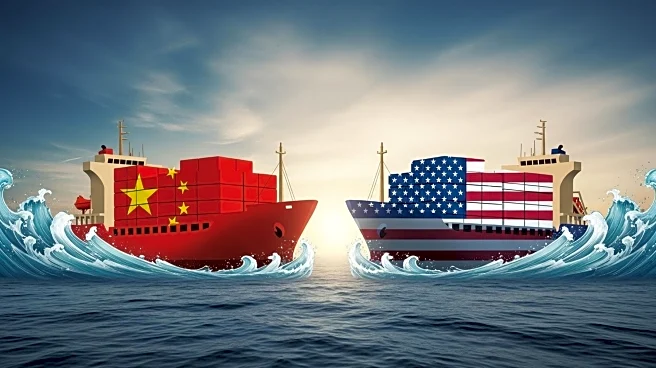What's Happening?
China's Ministry of Transportation has announced the implementation of 'special port fees' for U.S. vessels, in response to the United States' decision to impose port fees on Chinese-owned, operated, or built ships. This move is part of ongoing trade tensions between the two nations, with China accusing the U.S. of protectionist practices that violate international trade principles. The U.S. Trade Representative had previously announced these fees as a measure against China's alleged attempts to dominate global shipping. China's reciprocal fees will apply to ships with significant U.S. interest, defined as 25 percent equity, and will be levied on ships built in the U.S. or flying the U.S. flag. The fees will start at 400 RMB per net ton in 2025, increasing annually to 1,120 RMB per net ton by 2028.
Why It's Important?
The imposition of reciprocal port fees by China highlights the escalating trade tensions between the two largest economies in the world. This development could have significant implications for maritime trade, potentially increasing costs for shipping companies and affecting global supply chains. The U.S. fees are intended to counter China's dominance in shipbuilding, but China's response could lead to further retaliatory measures, impacting negotiations for new trade agreements. The situation underscores the fragile nature of international trade relations and the potential for economic disruptions if these tensions continue to escalate.
What's Next?
As both countries prepare to implement their respective port fees, the maritime industry may face increased operational costs and logistical challenges. Shipping companies will need to assess the financial impact of these fees and adjust their strategies accordingly. The U.S. Customs and Border Protection has indicated that ship operators are responsible for determining fee applicability, and further guidance from the USTR is anticipated. The situation may evolve as both nations continue to negotiate trade agreements, and stakeholders in the shipping industry will be closely monitoring any developments or changes in policy.
Beyond the Headlines
The reciprocal port fees could have broader implications for international trade norms and the future of global shipping regulations. The actions taken by both the U.S. and China may set precedents for other countries considering similar measures in response to perceived trade imbalances. Additionally, the situation raises questions about the effectiveness of unilateral trade policies and their impact on global economic stability. As the maritime industry navigates these challenges, there may be increased calls for multilateral discussions to address trade disputes and promote fair competition.








